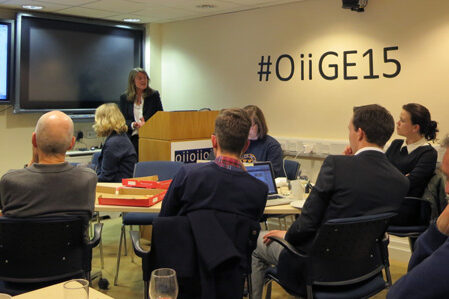
The Oxford Internet Institute undertook some live analysis of social media data over the night of the 2015 UK General Election. See more photos from the OII's election night party, or read about the data hack
‘Congratulations to my friend @Messina2012 on his role in the resounding Conservative victory in Britain’ tweeted David Axelrod, campaign advisor to Miliband, to his former colleague Jim Messina, Cameron’s strategy adviser, on May 8th. The former was Obama’s communications director and the latter campaign manager of Obama’s 2012 campaign. Along with other consultants and advisors and large-scale data management platforms from Obama’s hugely successful digital campaigns, Conservative and Labour used an arsenal of social media and digital tools to interact with voters throughout, as did all the parties competing for seats in the 2015 election. The parties ran very different kinds of digital campaigns. The Conservatives used advanced data science techniques borrowed from the US campaigns to understand how their policy announcements were being received and to target groups of individuals. They spent ten times as much as Labour on Facebook, using ads targeted at Facebook users according to their activities on the platform, geo-location and demographics. This was a top down strategy that involved working out was happening on social media and responding with targeted advertising, particularly for marginal seats. It was supplemented by the mainstream media, such as the Telegraph for example, which contacted its database of readers and subscribers to services such as Telegraph Money, urging them to vote Conservative. As Andrew Cooper tweeted after the election, ‘Big data, micro-targeting and social media campaigns just thrashed “5 million conversations” and “community organising”’. He has a point. Labour took a different approach to social media. Widely acknowledged to have the most boots on the real ground, knocking on doors, they took a similar ‘ground war’ approach to social media in local campaigns. Our own analysis at the Oxford Internet Institute shows that of the 450K tweets sent by candidates of the six largest parties in the month leading up to the general election, Labour party candidates sent over 120,000 while the Conservatives sent only 80,000, no more than…

